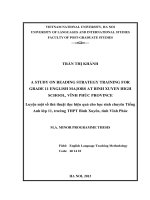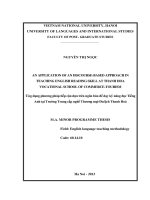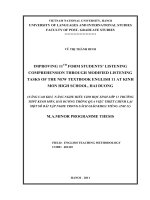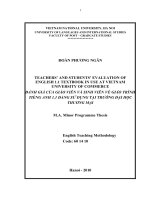Teaching English pronunciation with the textbook English 11 at Dong Hy High School
Bạn đang xem bản rút gọn của tài liệu. Xem và tải ngay bản đầy đủ của tài liệu tại đây (94.49 KB, 4 trang )
Teaching English pronunciation with the
textbook English 11 at Dong Hy High School
Hoàng Thị Thanh Hoa
Trường Đại học Ngoại ngữ
Luận văn Thạc sĩ ngành: English teaching methodology; Mã số: 60 14 10
Người hướng dẫn: Dr. Dương Thu Mai
Năm bảo vệ: 2012
Abstract. English language is considered as a main tool for global communication in
the modern world and pronunciation is considered as the key to successful
communication. Therefore, teaching pronunciation plays a very important role in
language teaching. Being able to speak English accurately and fluently is a desire for
anyone studying English and this seems to be the most challenging task for high school
students. However, teachers and students seem not to be much interested in
pronunciation and pronunciation matters. This study is aimed at investigating the
difficulties teachers and students at Dong Hy High School encounter during the process
of teaching and learning pronunciation with the textbook English 11, the factors
affecting the effect of pronunciation teaching and the solutions to overcome these
difficulties. The study data is collected by means of three main techniques:
questionnaire, interview and observation. The results show that there are internal and
external factors causing the difficulties in teaching and learning pronunciation in
English 11. The results of the study are used as the bases for a number of suggestions
about the techniques of teaching pronunciation to grade 11 students at Dong Hy High
School.
Keywords. Tiếng Anh; Phương pháp giảng dạy; Phát âm; Sách giáo khoa; Lớp 11
Content
1. Rationale of the study
Nowadays English has become one of the most popular languages in the world. It is widely used
in many fields such as business, science, education, technology, medicine, etc. English is also
considered as a main tool for global communication.
Correct pronunciation plays a very important part in using spoken English. Mispronunciation
may lead to misunderstanding and the process of the communication may even be broken down.
“A learner who consistently mispronounces a range of phonemes can be extremely difficult for a
speaker from another language community to understand” (Kelly, 2000, p.11). However, many
people learning English often do not pay attention to their pronunciation. Even worse, some of
them underestimate it. They think that pronunciation is less important than grammar and
vocabulary. Teachers and students at Dong Hy High School are not exception. In this school,
teachers usually pay more attention to grammar, vocabulary and other skills than pronunciation.
There are a number of reasons for this. First, in the textbooks (English 10, 11, 12), pronunciation
instruction accounts for very low proportion compared with the other parts. Second, all important
English exams at schools as well as the entrance exam to universities are always in written form
so most teachers and students have little motivation to teach and to learn pronunciation. Third, it
is more difficult for students to get a mark from pronunciation than other parts .From the real
teaching and learning situation at Dong Hy High School, The researcher would like to carry out a
study to clarify some difficulties in teaching and learning pronunciation, the reasons for them
and suggest some solutions to the problems.
2. Aim and objectives of the study
This study is aimed at investigating the situation and difficulties in teaching and learning
pronunciation with the textbook English 11, the reasons for them and then at suggesting the
solutions to help teachers and students overcome these difficulties. In order to achieve this aim,
some objectives are posed for exploration as follows:
- To find out the attitudes of teachers and learners towards teaching and learning pronunciation
at Dong Hy High School.
- To find out how pronunciation is taught at Dong Hy High School.
- To find out the difficulties and the causes of difficulties in teaching and learning Pronunciation
in Language focus periods - English 11.
3. Scope of the study
Pronunciation is a large area of language teaching and often causes learners and teachers a lot of
difficulties and there is a limited time; therefore, this research is aimed at investigating only the
difficulties in teaching and learning pronunciation with the textbook English 11that teachers and
students at Dong Hy High School have been facing and finding out the causes of these
difficulties. Besides, the study is also to suggest some implications for the teaching of
pronunciation matters designed in English 11, English consonantal matters.
4. Methods of the study
Both qualitative and quantitative methods are used in this study. Besides, many resources such
as books, magazines, articles, newspapers and some sources on the internet are reviewed by the
researcher.
In order to gain the most reliable results, the quantitative data are collected through a survey
questionnaire for 6 teachers and 100 grade 11 students at Dong Hy High School.
Along with the quantitative method, the qualitative data are obtained in classroom observation
and interviews with some students and teachers to collect further information.
After that, the results obtained from questionnaires, interview and observation are discussed then
some useful pronunciation teaching techniques are recommended.
5. Significance of the study
The textbook English 11 was designed with the hope that students could have a complete insight
into English consonantal sounds. However, there has not been much investigation into the fact
that whether lessons of pronunciation are suitable and comprehensible for students; or whether
the teaching of pronunciation for students of grade 11 is easy- undertaken. This research
provides an insight into the difficulties that are often met by teachers teaching English for grades
11 in Dong Hy High School. In addition, this research also points out some feasible solutions
which are, hopefully, beneficial for both teachers and students.
6. Design of the study
The study is divided into three parts:
The first part “Introduction” presents the rationale, the aim and objectives, the scope, the
methods, significance and the design of the study.
The second part “Development” consists of four chapters:
Chapter 1 provides a thorough literature review relevant to the study. It presents the theoretical
background: the concepts relating to pronunciation, importance of teaching pronunciation,
English pronunciation teaching to foreign language learners, factors affecting pronunciation
teaching. Teaching of English Consonants is also mentioned in this chapter.
Chapter 2, chapter 3 constitutes the body of the study. Chapter 2 is the study description with an
overview on situation of teaching and learning English at Dong Hy High School, research
questions, and research methodology and data analysis process. Chapter 3 presents the data
analysis results and discussions.
Chapter 4 concludes the findings the researcher has found from the study and proposes some
solutions to the teaching of pronunciation for grade 11 at Dong Hy High School.
The last part of the study “Conclusion” gives a brief description of the study and states the
limitations as well as the recommendations for further study.
References
1. Brown, A . (1991). Teaching English pronunciation: A book of reading, Foreign Language
Study , p 93-173.
2. Burn, A & Claire, A. ( 2003). Clearly speaking: Pronunciation in action for teacher.
3. Crystal, D. (1995). The Cambridge Encyclopedia of the English Language. Cambridge:
Cambridge University press.
4. Dalton, C and Seidlhofer, B. (1994). Pronunciation. Oxford University Press, Oxford. p 12-
15, p 67-70, p130-146.
5. Dao Thi My Hanh. (2007). A Study on Pronunciation of some English Consonants by
Vietnamese learners. MA Thesis. Hanoi National University, Hanoi.
6. Diep Thi Hong Lien. (2010). Challenges in teaching English to ethnic minority students in a
mountainous province. MA Thesis. Hanoi National University, Hanoi.
7. Gilakajani,. A. P. (2012). The significance of pronunciation in English language teaching.
Lahijan Branch, Islamic Azad University, Lahijan, Iran.
8. Ha Cam Tam . (2005). Common pronunciation problems of Vietnamese learners of English.
Journal of Science - Foreign Languages (Retrieved from:
9. Harmer, J. (2007). The practice of English language teaching (4rd ed.). London: Longman.
10. Harris, B. (2003).What are some different teaching methods? ( Retrieved from:
11. Hewings, M. (2004). Pronunciation practice activities : a resource book for teaching
English pronunciation. Cambridge University Press, New York. p 10-23, p 73-77.
12. Hismanoglu, H.(2006). Current Perspectives on Pronunciation Learning and Teaching.
13.Hoang Van Van, Hoang Thi Xuan Hoa, Do Tuan Minh, Nguyen Thu Phuong, Dao Ngoc Loc,
Vu Thi Loi and Nguyen Quoc Tuan. (2006; 2007; 2008). Tieng Anh 10, 11, 12. Education
Publishing House.
14. Kelly G. ( 2000). How to Teach Pronunciation. Malaysia : Longman.
15. Kenworthy, J. (1987). Teaching English Pronunciation. England: Longman
16. Kizlik,B. (2012). Instructional Methods Information.
17. Maniruzzaman (2007). M. Teaching Efl Pronunciation: Why, What and How? (Retrieved
from:
18. Morley, J. (1991). The pronunciation component in teaching English to speakers of other
languages. TESOL Quarterly.
19. Murcia, M. C& Brinton, D& Goodwin, J. M (1996). Teaching pronunciation: a reference
for teachers of English to speakers of other languages. Cambridge University Press, New
York. (p 3-8).
20. Nation, I. S. P& Newton,J.(2009). Teaching ESL/EFL listening and peaking . New York:
Routledge.
21. Nguyen Thi Thu Thao.(2007). Difficulties for Vietnamese when Pronouncing English: Final
Consonants. MA Thesis. Hanoi National University, Hanoi.
22 .Osburne, A.G. (1996). Final cluster reduction in English L2 speech: A case study of a
Vietnamese speaker. Applied Linguistics 17. p164-181.
23. River. W. M.(1968).Teaching Foreign Language Skill(2
nd
ed). Chicago, I.L, Chicago
University Press.
24.Taiffalo.(2001). Sound System in Vietnamese.
25. Ur, Penny. (1996). A course in language teaching: Practice and theory. New York:
Cambridge University Press.
26. Vo Dai Quang. (2006). Lectures on Principles of Phonetics and Phonology. p24
27. Underhill, A. (2004). Sound Founds- Learning and Teaching Pronunciation. Macmillan,
London. p29- 30.
28.Walker, R. (2001). Pronunciation for international intelligibility. English Teaching
Professional.
29. Zawadzki, H. 1994. In tempo: An English pronunciation course. National Centre for English
Language Teaching and Research, Macquarie University, Sydney, NSW.









